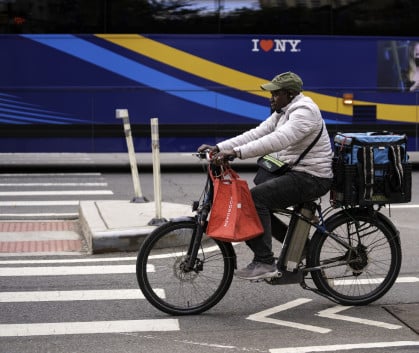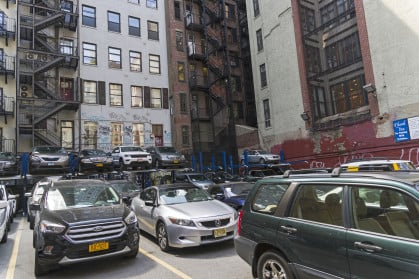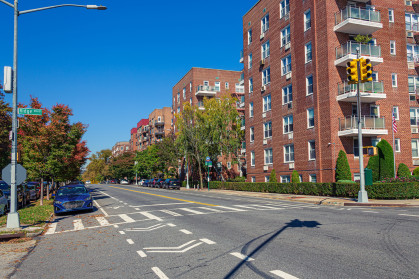We're worried about lithium-ion battery fires in our building. How do we create an e-bike policy?
- Some buildings require proof that e-batteries were purchased new and are UL certified
- Consider storing e-bikes in a bike room only and banning them from residential units

There's no legislation regulating how e-bikes are stored in residential buildings, so buildings are drafting their own policies.
iStock
The increasing number of e-bike and e-scooter lithium-ion battery fires in New York City is understandably a concern to board members who are trying to understand the gravity of the situation and what they can do to minimize risk.
While New York City implemented a trade-in program for the highest risk batteries to increase safety, there's currently no legislation in place regulating e-bikes being stored in residential buildings. Until legislation is passed, buildings are essentially on their own in how they handle this potential hazard.
If your board wants to take action, here's how to go about it, as well as an array of policies enacted by boards around the city.
Assemble your team and consult your by-laws
Start by speaking with those who can help facilitate the decision-making process including your managing agent; your insurance broker, who can let you know if there are any policy requirements that you may be required to adopt; and your attorney.
Your attorney can advise on city/state/federal requirements and laws that may apply as well as applicable case law and any constraints based on your specific by-laws. They can also assist in determining whether or not you should establish a policy and how your position would be defensible if a fire occurred and the building/board were to be named in any legal actions or negative PR.
Evaluate your building and locate the e-bikes
Next, evaluate your specific situation. Here are some questions to help you explore how you may want to approach your policies.
Identify the scope of the problem: How many e-bikes are in the building?
What resources does your building have: Do you have a bike room, is it fire safe, does it have outlets and the necessary circuit capacity?
Insurance requirements: Does your building have insurance requirements for residents and owners?
Your building’s electrical load: Can your building’s infrastructure support the charging needs of the e-bikes that residents own?
Know your residents and owners: What is the level of concern of residents and owners in your building? How educated are your residents and owners?
Draft your policy based on best practices
The Fire Department of New York issued safety tips regarding e-bike and battery risks. To get an idea of how other buildings are managing their risk, below are some rules that we have heard are implemented in other NYC buildings:
- All e-bikes are banned from the building.
- Only owners are permitted to have e-bikes, renters are not allowed to have e-bikes.
- E-bikes owners must provide proof that e-batteries were purchased new and are UL certified. No refurbished batteries are permitted in the building.
- E-bikes must be registered and proof of insurance is required.
- E-bike owners must sign a disclaimer acknowledging that they received, reviewed and will comply with FDNY best practice recommendations.
- E-bikes must be stored in the bike room only and are not permitted in individual units.
- E-bikes or e-bike batteries may not be charged in units.
- Chargers must be of a type that cut off power automatically once the battery is charged. Owners must provide proof (receipt) that this is the type of charger they are using.
- E-bikes may only be charged using an outlet that is not overloaded. It may not be charged using a power strip.
- E-bikes may not be charged on building premises, not in apartments and not in a bike room.
- When charging e-bikes, the owner must not leave the e-bike unattended.
- E-bikes must be covered by a fire proof blanket when charging.
- E-bike storage and charging must follow the guidelines outlined by the FDNY and future city/ state/ national laws.
- E-bike policies will follow city/state/national laws, when and if they are enacted.
Be sure to bring your proposed policies to your attorney for review.
Communicate your new policy to owners or shareholders
If you decide to put a policy in place for e-bikes and e-scooters, you should inform the full building, all residents and owners. Depending on the policies, you may want to educate owners and residents about the importance of and concerns surrounding e-bike storage and charging practices. Your managing agent should have literature to help educate residents and owners on the risks surrounding lithium-ion batteries.
For more information about the concerns around lithium-ion battery fires, we suggest checking out this article.
Corinne Arnold and Will Kwan have 25+ years of combined board member experience in large cooperatives in Manhattan. They are connected to a network of board members in other buildings, which they tap into when writing this column. They are also founders of EZ Election Solutions, a third-party election firm that manages elections and meetings for co-ops and condos across New York City. Have a question for this column? Email [email protected].
Sign Up for our Boards & Buildings Newsletter (Coming Soon!)
Thank you for your interest in our newsletter. You have been successfully added to our mailing list and will receive it when it becomes available.
























